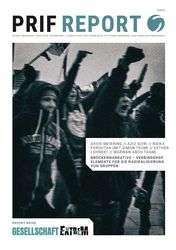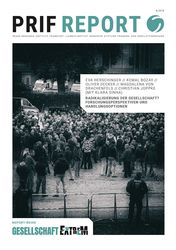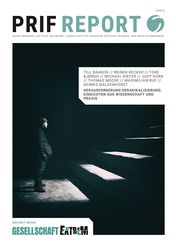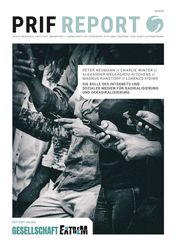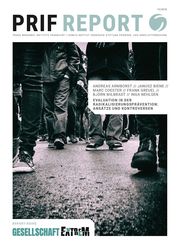PRIF Reports / Working Paper
The seven Working Papers in this PRIF report series provide an inventory of the state of research on radicalisation and deradicalisation. The following central dimensions are highlighted: Controversies on the concept of radicalisation, radicalisation processes of individuals and groups, radicalisation tendencies of societies, challenges in deradicalisation work, the importance of online radicalisation as well as approaches and controversies in the evaluation of prevention measures are examined.
Please note that all reports have been written and published in German only. We do provide short English summaries below, however.
PRIF Report 5/2018: What is radicalization?
Was ist Radikalisierung? Präzisierungen eines umstrittenen Begriffs
Hande Abay Gaspar // Christopher Daase // Nicole Deitelhoff // Julian Junk // Manjana Sold
Nowadays, radicalism and radicalization are deemed central features of the global political crisis. This belies how ambivalent the term is. This report argues for a broader understanding of radicalization to explore the whole spectrum of radicalization phenomena: from radicalization without violence to radicalization into violence and radicalization in violence. This allows to account for the various facets of radicalization, as radicalism can be politically quite productive. A broad concept of radicalization ignores neither the criticism of curtailing civil liberties nor the potential of stigmatization, but breaks free from the seemingly inseparable relationship with immediate danger situations. In addition, such broad understanding opens up the discursive and regulative space in the area of primary, secondary and tertiary prevention.
PRIF Report 6/2018: The radicalization of individuals
Radikalisierung von Individuen: Ein Überblick über mögliche Erklärungsansätze
Fabian Srowig // Viktoria Roth // Daniela Pisoiu // Katharina Seewald // Andreas Zick
Why do individuals radicalize? This report provides a systematic overview of the state of the art on the causes and consequences of individual radicalization, describing how they interact with other people, social groups and organizations or institutions. Appropriating extremist thought as well as belonging to an extremist peer group in adolescence satisfies general needs such as recognition and group affiliation, but also reduces uncertainties and identity conflicts. Ideologies offer individuals comprehensible interpretation patterns and individual action alternatives for specific problem situations. The report develops suggestions for future preventive and therapeutic measures from its findings.
PRIF Report 7/2018: Bridging narratives
Brücken-Narrative: Verbindende Elemente für die Radikalisierung von Gruppen
David Meiering // Aziz Dziri // Naika Foroutan (mit Simon Teune // Esther Lehnert // Marwan Abou-Taam)
Radical groups present enormous challenges not only to security authorities, but to society as a whole. On the basis of existing research, the present report develops how radicalization processes take place within and between groups and what role such group processes play in the overall societal context. It focuses in particular on how certain ideological elements of different radical groups overlap. These similarities are referred to in the report as ‘bridge narratives’. The first of these narratives covers anti-imperialism, anti-modernism and anti-universalism and has anti-Semitism as a common vanishing point. The second bridge-narrative, anti-feminism, brings together völkisch nationalists, Christian and Islamic fundamentalists and Islamist jihadists. The third bridge-narrative consists of the idea of carrying out (legitimate) resistance, justifying violence. The article highlights the importance of addressing these narratives in prevention work, that is, to develop measures that target the common ideological pattern of different radical groups.
RIF Report 8/2018: The radicalization of society?
Radikalisierung der Gesellschaft? Forschungsperspektiven und Handlungsoptionen
Eva Herschinger // Kemal Bozay // Oliver Decker // Magdalena von Drachenfels // Christian Joppke (mit Klara Sinha)
Which factors favour societal radicalization? Little work in international and national radicalization research is interested directly in the societal level and discusses the impact of radicalized groups, milieus and strata on society and its potential radicalization. This report gives on overview of current research and discusses factors favouring societal radicalization. The latter arises when the legitimacy of the political system is called into question and a departure from prevailing social norms in political dealings is witnessed, especially if the use of political violence is no longer rejected. All in all, radicalized individuals, groups, milieus or strata, can harbour the potential of societal radicalization. Increasing and incremental socio-political changes can lead to decreasing social cohesion. In view of this possibility, the authors call for strengthening social resilience and civilizing the public debate.
PRIF Report 9/2018: The challenges of deradicalization
Herausforderung Deradikalisierung: Einsichten aus Wissenschaft und Praxis
Till Baaken // Reiner Becker // Tore Bjørgo // Michael Kiefer // Judy Korn // Thomas Mücke // Maximilian Ruf // Dennis Walkenhorst
Compared to the topic of “radicalization”, “deradicalization” has so far been treated as secondary in science. This report systematically outlines the most important findings from theoretical literature and from the practice of deradicalization. It turns out that central actors from practice, science, (security) authorities and politics not only use different definitions, there is also no agreement on what deradicalization (practically) means. In addition, the provider landscape of extremism prevention is as diverse as the political systems. The existing hybrid model of state and civic competences in Germany, for instance, as well as the variety of approaches and profiles of the consultants can - with proper accentuation - be seen as an opportunity.
PRIF Report 10/2018: The role of the Internet and social media
Die Rolle des Internets und sozialer Medien für Radikalisierung und Deradikalisierung
Peter Neumann // Charlie Winter // Alexander Meleagrou-Hitchens // Magnus Ranstorp // Lorenzo Vidino
What is the role of the internet in the radicalization of individuals and groups? On the basis of an overview of existing research, this report examines how and why extremist organizations and individuals use the internet and discusses ways (and limits) of how online extremism can be tackled effectively. It demonstrates that the use of internet services by extremist groups is often rather amateurish and conventional, a finding that should also be taken into account when developing countermeasures. Pure online countermeasures are have limits, since offline and online radicalization are closely intertwined and cannot be considered separately. In order to cope with the structure and use habits of the internet, a close interaction between public and private actors in the development of strategies is required. The public sector should provide incentives and weigh up the impact of critical censorship measures more serious than before.
PRIF Report 11/2018: Evaluations in extremism prevention
Evaluation in der Radikalisierungsprävention: Ansätze und Kontroversen
Andreas Armborst // Janusz Biene // Marc Coester // Frank Greuel // Björn Milbradt // Inga Nehlsen
This report takes the increasing public interest in various measures and approaches of radicalization prevention as the starting point for a critical discussion on evaluation. Evaluations help to understand how the prevention of radicalization and extremism works in a social context. Thus, evaluations can provide important information on the frequently asked question of the visible success of prevention. At the same time, there are exaggerated expectations regarding the efficiency and feasibility of impact evaluations in the debate on the so-called “evidence-based” prevention. The legitimate interest in robust evidence of efficacy poses significant challenges in planning and conducting evaluation studies in the field of deradicalization, distancing, and radicalization prevention. This article addresses some of these difficulties and illustrates different approaches to translating evaluations into realistic frameworks. The idea of “evidence-based” prevention can only work if the evaluation research is aware of and critically reflects the peculiarities, contradictions and controversies in science and practice.
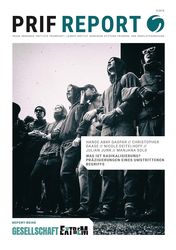
![PRIF Report 6 2018 [Translate to English:] PRIF Report 6/2018 | Radikalisierung von Individuen: Ein Überblick über mögliche Erklärungsansätze](/fileadmin/_processed_/1/4/csm_PRIF_Report_6-2018_91361cbc72.jpg)
